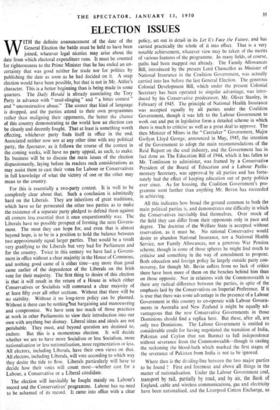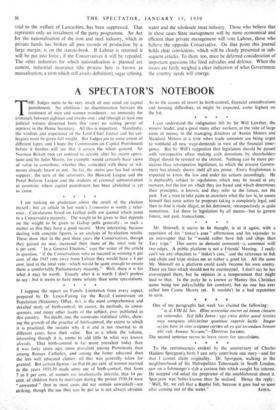ELECTION ISSUES
WITH the definite announcement of the date of the General Election the battle must be held to have been joined, whatever legal niceties may arise about the date from which electoral expenditure runs. It must be counted for righteousness to the Prime Minister that he has ended an un- certainty that was good neither for trade nor for politics by publishing the date as soon as he had decided on it. A snap election would have been possible, but that is not in Mr. Attlee's character. This is a better beginning than is being made in some quarters. The Daily Herald is already associating the Tory Party in advance with " mud-slinging " and "a bitter contest" and " unconstructive abuse." The sooner that kind of language is dropped, and the parties attend to their own programmes rather than maligning their opponents, the better the chance of this country demonstrating to the world how an election can be cleanly and decently fought. That at least is something worth effecting, whichever party finds itself in office in the end. Associated neither now nor at any other time with any political party, the Spectator, as it follows the course of the contest in the coming weeks, will have no party appeal, as such, to make. Its business will be to discuss the main issues of the election dispassionately, laying before its readers such considerations as may assist them to cast their votes for Labour or Conservatives in full knowledge of what the victory of one or the other may mean to the country.
For this is essentially a two-party contest. It is well to be completely clear about that. Such a conclusion is admittedly hard on the Liberals. They are inheritors of great traditions, which have so far permeated the other two parties as to make the existence of a separate party pledged to defend them against all corners less essential than it once unquestionably was. The Liberals have no possible prospect of forming the next Govern- ment. The most they can hope for, and even that is almost beyond hope, is to be in a position to hold the balance between two approximately equal larger parties. That would be a result very gratifying to the Liberals but very bad for Parliament and for the country. Twice in this century we have had a Govern- ment in office without a clear majority in the House of Commons, and nothing good came of it either time—any more than good came earlier of the dependence of the Liberals on the Irish vote for their majority. The first thing to desire of this election is that it will result- in the return of a House in which either Conservatives or Socialists will command a clear majority of at least fifty over all other sections. Without that there will be no stability. Without it no long-term policy can be planned. Without it there can be nothingsbut bargaining and manoeuvring and compromise. We have seen too much of those practices at work in other Parliaments to view their introduction into our own with anything but dismay. Liberal ideas and ideals are not perishable. They must, and beyond question are destined .to, endure. But this is a momentous election. It will decide whether we are to have more Socialism or less Socialism, more nationalisation 'or less nationalisation, more regimentation or less. All electors, including Liberals, have their own views on that. All electors, including Liberals, will vote according to which way they desire the tide to flow. Liberals particularly will have to decide how their votes will count most—whether cast for a Labour, a Conservative or a Liberal candidate.
The election will inevitably be fought mainly on Labour's record and the Conservatiyes' programme. Labour has no need to be ashamed of its record. It came into office with a clear policy, set out in detail in its Let Us Face the Future, and has carried practically the whole of it into effect. That is a very notable achievement, whatever view may be taken of the merits of various features of the programme. In many fields, of course, paths had been mapped out already. The Family Allowances Bill, introduced by the present Lord Chancellor as Minister of National Insurance in the Coalition Government, was actually carried into law before the last General Election. The generous Colonial Development Bill, which under the present Colonial Secretary has been operated to singular advantage, was intro- duced by his Conservative predecessor, Mr. Oliver Stanley, in February of 1945. The principle of National Health Insurance was accepted equally by all parties under the Coalition Government, though it was left to the Labour Government to work out and put in legislative form a detailed scheme in which there is much to criticise as well as a great deal to approve. The then Minister of Mines in the " Caretaker " Government, Major Gwilym Lloyd George, announced in May, 1945, the intention of the Government to adopt the main recommendations of the Reid Report on the coal industry, and the Government has in fact done so. The Education Bill of 1944, which it has fallen to Mr. Tomlinson to administer, was framed by a Conservative President of the Board of Education and a Labour Parlia- mentary Secretary, was approved by all parties and has fortu- nately had the effect of keeping education out of party politics ever since. As for housing, the Coalition Government's pro- gramme went further than anything Mr. Bevan has succeeded in achieving.
All this indicates how broad the ground common to both the main political parties is, and demonstrates one difficulty in which the Conservatives inevitably find themselves. Over much of the field they can differ from their opponents only in pace and degree. The doctrine of the Welfare State is accepted without reservation, as it must be. No rational Conservative would desire to abandon National Insurance, nor a National Health Service, nor Family Allowances, nor a generous War Pension scheme, though in some of those spheres he might find much to criticise and something in the way of amendment to propose. Both education and foreign policy lie largely outside party con- troversy, for though Mr. Bevin suffers from no lack of critics there have been more of them on the benches behind him than on those opposite. Nor in relations with the Commonwealth is there any radical difference between the parties, in spite of the emphasis laid by the Conservatives on Imperial Preference. If it is true that there was some advantage in the presence of a Labour Government in this country to co-operate with Labour Govern- ments in Australia and New Zealand it might be equally ad- vantageous that the new Conservative Governments in those Dominions should find a replica here. But these, after all, are only two Dominions. The Labour Government is entitled to considerable credit for having negotiated the transition of India, Pakistan and Ceylon (but not Burma) to full independence without severance from the Commonwealth—though in casting the reckoning the blood-bath which marked the first stages of the severance of Pakistan from India is not to be ignored.
Where then is the dividing-line between the two major parties to be found ? First and foremost and above all things in the matter of nationalisation. Under the Labour Government coal, transport by rail, partially by road, and by air, the Bank of England, cable and wireless communications, gas and electricity have been nationalised, and the Liverpool Cotton Exchange, so vital to the welfare of Lancashire, has been suppressed. That represents only an instalment of the party programme. An Act for the nationalisation of the iron and steel industry, which in private hands has broken all past records of production by a large margin, is on the statute-book. If Labour is returned it will be put into force ; if the Conservatives it will be repealed. The other industries for which nationalisation is planned are cement, industrial insurance (the process here is known as mutualisation, a term which still awaits definition), sugar refining, water and the wholesale meat industry. Those who believe that in these cases State management will be more economical and efficient than private management will vote Labour, those who believe the opposite Conservative. On that point this journal holds clear convictions, which will be clearly presented in sub- sequent articles. To them, too, must be deferred consideration of important questions like food subsidies and defence. When the issues are fairly weighed a clear indication of what Government the country needs will emerge.































 Previous page
Previous page